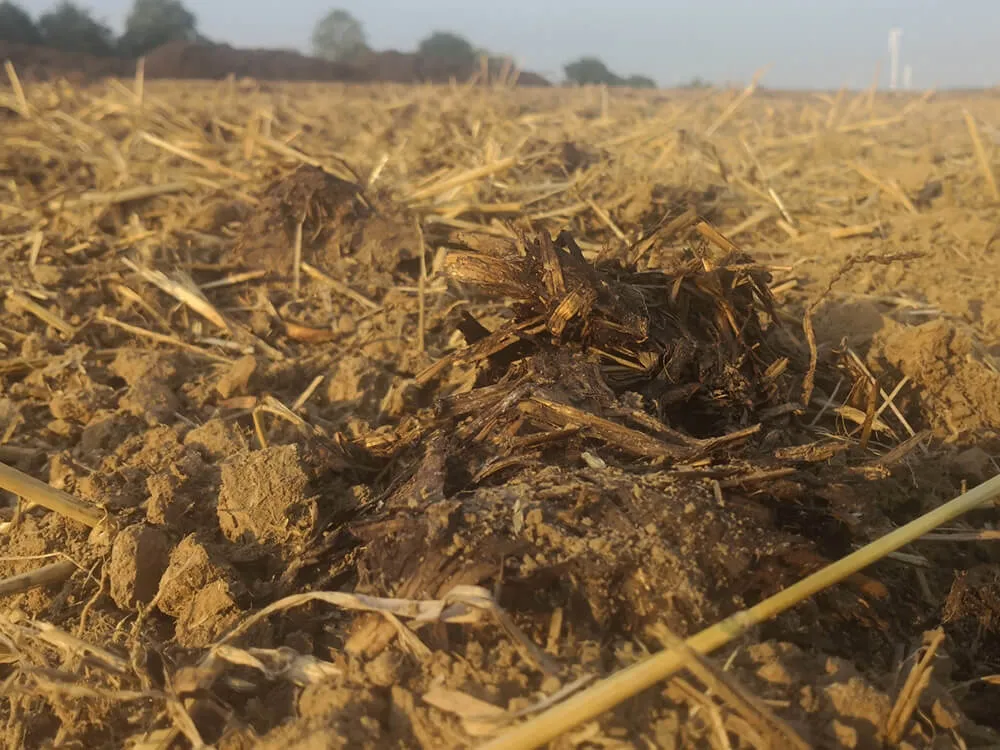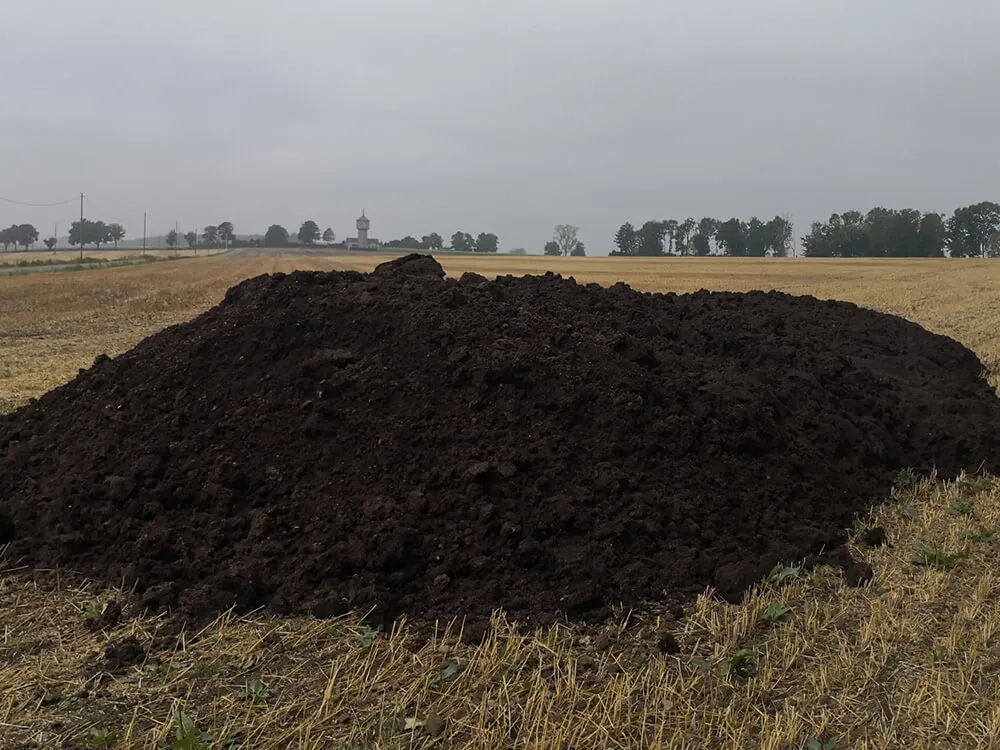





Soil Capital is regularly asked about the agronomic feasibility of certain agricultural practices that are beneficial to a farm's carbon footprint. The sixth episode of the Radio Carbone podcast is devoted to the use of organic products, which can significantly improve the carbon balance of a farm plot, but whose forms (manure or compost in this article) and effects on the soil (storage of organic matter and stimulation of soil life in particular) can vary widely.
Xavier, a farmer in Haute-Marne (52, Grand-Est region), is involved in the Soil Capital carbon programme. He asked us to help him decide whether spreading fresh manure is the best way to make the most of the organic matter available to him, in terms of agronomic benefits, or whether it would be more beneficial to compost it. As an organic farmer, Xavier currently spreads fresh horse and cattle manure on his plots.
In partnership with Icosystème, Thibault Déplanche, director of the Celesta-lab* laboratory, answers Xavier's question by pointing out that each type of organic product has its advantages and disadvantages, and that the choice of one or other depends on the agronomic objective being pursued.
*A laboratory specialising in analysis, research and advice on soil biology and the use of organic products.
Thibaut explains that composting produces very stable carbon, because the digestible (easily mineralised) forms of carbon have been consumed in the form of biological activity (and therefore the production of carbon dioxide - CO2) during the process. This loss of digestible carbon is the reason for the reduction in volume of composted manure. As a result, the main effect of adding compost is to enrich the soil with stable carbon, and so build up the stock of organic matter over the long term.
The effect of adding fresh manure is twofold: it provides a stable carbon source similar to compost, but it is also a source of digestible carbon that will feed the soil's biology and stimulate micro-organisms. However, fresh manure has a lower 'range of use' than compost, because it is more difficult to spread, and contains pathogens and weed seeds that the composting process can eliminate (hygienisation by heating).

If you're looking to rapidly increase the stable organic matter content of the soil, Thibaut recommends using compost, as it is low-risk and can be applied in large quantities. By way of comparison, 50 tonnes per hectare (t/h) of compost can easily be applied (provided you have the financial resources), while spreading 50 tonnes of fresh manure can be much riskier, depending on the straw content and fragility of the soil.
On the other hand, if you're looking to stimulate soil life and improve structure in the very short term, fresh manure is more appropriate. As far as the quantity to be applied is concerned, Thibaut says that an application of 20 t/ha minimizes the risks. In the particular case of Xavier's farm, whose soils are rich in organic matter (5%), "we probably have more resilience, which would allow us to increase to around thirty to forty tonnes without encountering major problems". However, in the context of organic farming, where nitrogen fertilization is more complicated to control, Thibaut would limit inputs by twenty to thirty tonnes.
For Thibaut, the choice between manure and compost is first and foremost a question of agronomic objectives.


Soil Capital is regularly asked about the agronomic feasibility of certain agricultural practices that are beneficial to a farm's carbon footprint. The sixth episode of the Radio Carbone podcast is devoted to the use of organic products, which can significantly improve the carbon balance of a farm plot, but whose forms (manure or compost in this article) and effects on the soil (storage of organic matter and stimulation of soil life in particular) can vary widely.
Xavier, a farmer in Haute-Marne (52, Grand-Est region), is involved in the Soil Capital carbon programme. He asked us to help him decide whether spreading fresh manure is the best way to make the most of the organic matter available to him, in terms of agronomic benefits, or whether it would be more beneficial to compost it. As an organic farmer, Xavier currently spreads fresh horse and cattle manure on his plots.
In partnership with Icosystème, Thibault Déplanche, director of the Celesta-lab* laboratory, answers Xavier's question by pointing out that each type of organic product has its advantages and disadvantages, and that the choice of one or other depends on the agronomic objective being pursued.
*A laboratory specialising in analysis, research and advice on soil biology and the use of organic products.
Thibaut explains that composting produces very stable carbon, because the digestible (easily mineralised) forms of carbon have been consumed in the form of biological activity (and therefore the production of carbon dioxide - CO2) during the process. This loss of digestible carbon is the reason for the reduction in volume of composted manure. As a result, the main effect of adding compost is to enrich the soil with stable carbon, and so build up the stock of organic matter over the long term.
The effect of adding fresh manure is twofold: it provides a stable carbon source similar to compost, but it is also a source of digestible carbon that will feed the soil's biology and stimulate micro-organisms. However, fresh manure has a lower 'range of use' than compost, because it is more difficult to spread, and contains pathogens and weed seeds that the composting process can eliminate (hygienisation by heating).

If you're looking to rapidly increase the stable organic matter content of the soil, Thibaut recommends using compost, as it is low-risk and can be applied in large quantities. By way of comparison, 50 tonnes per hectare (t/h) of compost can easily be applied (provided you have the financial resources), while spreading 50 tonnes of fresh manure can be much riskier, depending on the straw content and fragility of the soil.
On the other hand, if you're looking to stimulate soil life and improve structure in the very short term, fresh manure is more appropriate. As far as the quantity to be applied is concerned, Thibaut says that an application of 20 t/ha minimizes the risks. In the particular case of Xavier's farm, whose soils are rich in organic matter (5%), "we probably have more resilience, which would allow us to increase to around thirty to forty tonnes without encountering major problems". However, in the context of organic farming, where nitrogen fertilization is more complicated to control, Thibaut would limit inputs by twenty to thirty tonnes.
For Thibaut, the choice between manure and compost is first and foremost a question of agronomic objectives.
